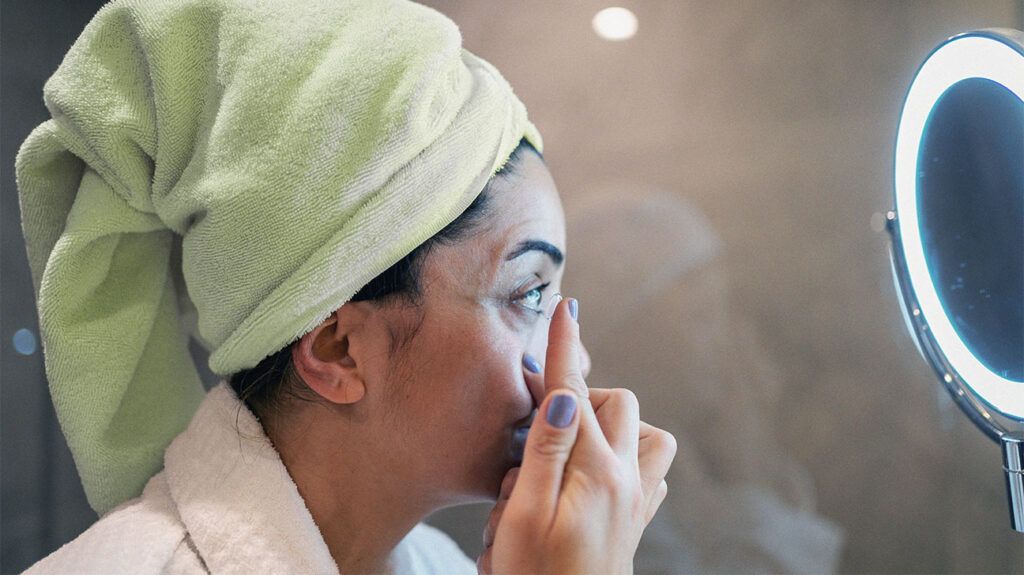A person with glaucoma may be able to wear contact lenses. However, this can depend on the severity of their condition, and the type of treatment they receive.
Glaucoma is a condition in which pressure buildup in the eye can damage the optic nerve and lead to vision loss.
If a doctor confirms that an affected person can wear contact lenses, they may recommend using a certain type, such as hard contact lenses.
People with glaucoma should follow any specific eye care instructions from their doctor.
This article explains whether a person with glaucoma can wear contact lenses, including whether contact lenses may interfere with treatment, safety tips, and when to get help.

People with glaucoma may be able to wear contact lenses. However, they may have to follow specific instructions. Others may not be able to wear contact lenses or may have to avoid wearing them for a period after treatment.
For example, a doctor may recommend a person avoid wearing contact lenses temporarily or permanently following eye surgery.
The
A doctor will advise someone with glaucoma on whether and how to wear contact lenses, depending on their treatment. They may recommend that a person wear a specific type of contact lens.
Types of contact lenses include:
- Hard contact lenses: The most common type in the general population is rigid gas-permeable lenses, although people who have undergone trabeculectomy, a type of surgery for glaucoma, may wear scleral lenses.
- Soft contact lenses: These types of lenses are soft and flexible, and may be available as disposable daily wear contacts or lenses that a person can wear for longer periods.
Hard lenses may be a better option than soft lenses for individuals who have had surgery to treat glaucoma. However, they may present problems for people who have undergone surgery, such as trabeculectomy.
This is because incisional surgery like this can increase the risk of an eye infection. A contact lens may absorb bacteria from an infection and cause it to sit on the eye’s surface.
Individuals can speak with a healthcare professional about the best type of contact lens for them.
Contact lenses may interfere with glaucoma treatment. A doctor may recommend someone avoid them or use them in a specific way, depending on their treatment type.
Treatments for glaucoma
Medicated eye drops
Glaucoma treatment may require a person to administer eye drops
A person should remove contact lenses before applying the drops and wait at least 15 minutes after application before wearing contact lenses.
Contact lenses can trap eye drops, causing the medication to stay on the eye for longer than anticipated. This can lead to irritation.
Medicated eye drops for glaucoma can also contain the preservative benzalkonium chloride (BAK). Contact lenses may absorb BAK molecules and slowly release them into the eye over time.
This may disrupt the cells in the outer layer of the cornea, which may lead to dryness and inflammation.
Laser treatment
A doctor may use laser treatment to help fluid drain from the eye and reduce eye pressure. Doctors are
After laser treatment, a person may be able to continue wearing contact lenses, but they should speak with their surgeon first.
A doctor may suggest that people wait until their eyes heal after laser surgery before wearing contact lenses to avoid irritation and minimize the risk of infection.
Surgery
Minimally-invasive glaucoma surgery is the
During a trabeculectomy, a surgeon will create a small opening called a bleb in the eye to help fluid drain more easily. Both hard and soft contact lenses may reduce the effectiveness of a bleb.
Hard contact lenses may compress a bleb, making it more difficult for fluid to drain through the channel.
Soft contact lenses, which are typically smaller, do not fully cover the eye’s surface. The edge of the lens may overlap the bleb and rub against it during blinking, which could cause tissue breakdown, leakage, and infection.
A doctor will advise a person on whether they can wear contact lenses following surgery for glaucoma.
A doctor will advise people whether they should avoid contact lenses during glaucoma treatment. They may have to avoid contact lenses temporarily after laser treatment, or permanently after eye surgery.
Tips for safely wearing contact lenses with glaucoma
- waiting at least 15 minutes to wear contacts after administering eye drops
- removing contact lenses before administering medicated eye drops
- avoiding cleaning contact lenses with water
- removing contact lenses before swimming, bathing, or showering
- correctly disinfecting contact lenses with lens solution
- avoiding mixing old and new lens solution
- storing contact lenses in a lens case
- replacing the lens case every 3 months
- wearing contact lenses only for the amount of time a doctor recommends
- washing and drying hands before touching contact lenses
A person should contact a doctor or eye care professional if they experience symptoms of eye irritation or infection from wearing contact lenses,
- swelling
- eye pain or discomfort
- burning or itching
- redness
- feeling as though the eye is gritty
- blurred vision
- sensitivity to light
- excessive discharge or tearing
A person with glaucoma may be able to wear contact lenses, depending on the type of treatment they receive. However, wearing contact lenses may increase the risk of infection in people with glaucoma who use medicated eye drops.
A person may be able to wear contact lenses after laser treatment for glaucoma but may have to wait until their eyes fully heal after treatment.
Someone who has undergone a trabeculectomy may not be able to wear contact lenses, as they may reduce the effectiveness of the bleb, the new drainage channel.
A doctor can advise someone on whether and how to wear contact lenses during and after glaucoma treatment.
